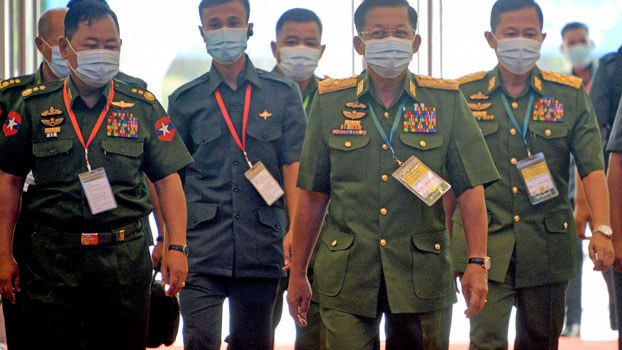UN member states criticize China over Uyghurs at Human Rights Council session
Nearly 50 United Nations member states on Wednesday issued a joint statement criticizing China’s atrocities against Uyghurs and calling on the U.N. human rights chief to release a long-overdue report on abuses in Xinjiang. Paul Bekkers, the permanent representative of the Netherlands to the U.N. office in Geneva, delivered the statement on behalf of 47 countries, saying the member states continued to be “gravely concerned” about the human rights situation in the Xinjiang Uyghur Autonomous Region (XUAR). Bekkers cited well-researched and credible reports of the detention of more than 1.8 million Uyghurs and other Turkic minorities in the region, along with widespread surveillance, discrimination, and severe restrictions on culture and freedom of religion that these groups face there. “We are also concerned about reports of torture and other cruel, inhuman or degrading treatment or punishment, forced sterilization, sexual and gender-based violence, forced labor, and forced separation of children from their parents by authorities,” he said. Bekkers also said the member states continued to be “gravely concerned” about deteriorating human rights situations in Hong Kong and Tibet. In the statement, the nations urged China to respect for the rule of law, to protect human rights, to provide unfettered access for independent observers to Xinjiang, and to respect the principle of non-refoulement, which prevents people who have the right to be recognized as refugees from being forcefully returned to countries where they could be harmed. The statement from the member states came more than two weeks after Michelle Bachelet, a former Chilean president who has served as the U.N. high commissioner for human rights since 2018, wrapped up a six-day visit to China in May, including stops in its far-western region Xinjiang. At a news briefing following the visit, Bachelet, 70, said she was not in China for an official investigation of the situation in Xinjiang, though she said she had “unsupervised” access to sources that the U.N. had arranged to meet there. Uyghur rights groups demanded her resignation after they said she repeated Chinese talking points and said she had been unable to assess the full scale of what Beijing calls “vocational education and training centers” in Xinjiang, but which the human rights community and scholars call internment camps. Bekkers said Beijing should stop arbitrary detentions and immediately release those held, end travel restrictions, and begin impartial investigations into allegations of racial, ethnic and ethno-religious profiling, which were among the eight recommendations relating to Xinjiang issued in August 2018 by the Committee on the Elimination of Racial Discrimination within Bachelet’s office. Bekkers also called on Bachelet to disclose more information about her visit to China. “We are interested in more detailed observations, including on the restrictions the Chinese authorities imposed on the visit as well as on your access to members of civil society and to places of your choice,” he said. As for the overdue report on abuses in Xinjiang, Bachelet informed the Human Rights Council in September 2021 that her office was finalizing its assessment of information on allegations of rights violations. Three months later, a spokesperson said the report would be issued in a matter of weeks, but it was not released. Support is growing The World Uyghur Congress (WUC) praised the issuance of the statement, saying it was pleased to see many countries from Latin America and the Pacific sign onto it, though the effort was bittersweet. “However, like last time, there is no single Muslim nation among them. It is very tragic,” said Semet Abla, vice chairman of WUC’s Executive Committee. But WUC president Dolkun Isa pointed out that the number of U.N. member states supporting the Uyghurs has been steadily growing with 47 backing Wednesday’s statement, compared to 43 showing support for Uyghur issues in 2021, and 14 in 2018. “Even Israel was one of the signatories of the statement,” he said. “Even though Turkey did not sign the statement, it issued a strong condemnation and rebuke of the Chinese concentration camps.” On Monday, Bachelet told officials attending the Human Rights Council session that she raised concerns about the human rights situation concerning Uyghurs and other predominantly Muslim minorities in Xinjiang during her trip. “My office’s assessment of the human rights situation in Xinjiang is being updated,” she said in an oral update at the session. “It will be shared with the government for factual comments before publication.” Bachelet also said that her office and the Chinese government agreed to hold an annual senior meeting on human rights and to continue exchanges on human rights issues of concern. “We are now elaborating concrete steps to put the agreements into action,” she said. Sophie Richardson, China director of New York-based Human Rights Watch, noted that Bachelet now has said that she will release the report before the end of her term ends in August or September. “And we certainly hope that she follows through on that,” she told RFA. “We are a bit skeptical, but nevertheless still think that it is extremely important to hear the United Nations Human Rights Office offer up its assessment based on remote monitoring of what Human Rights Watch deems crimes against humanity targeting Uyghurs and other Turkic communities,” Richardson said. Bachelet also said Monday that she would not seek a second term for personal reasons, but later told reporters her decision was not connected to criticism over her China trip. “As my term as high commissioner draws to a close, this council’s milestone 50th session will be the last which I brief,” she said. Translated by Mamatjan Juma for RFA Uyghur. Written in English by Roseanne Gerin.



